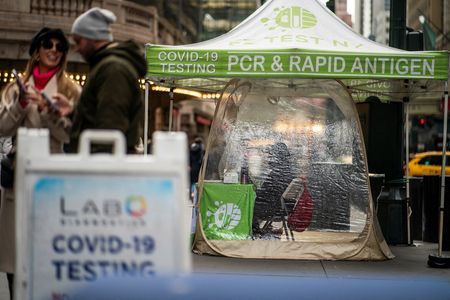By David Lawder
WASHINGTON (Reuters) -Nearly half of the $350 billion in COVID-19 assistance to state, local, tribal and territorial governments was budgeted as of March 31 for uses from lost revenue replacement to housing, broadband and job training, the U.S. Treasury Department said on Friday.
Data released by the department on the State and Local Fiscal Recovery Funds (SLFRF) showed these governments will continue to have substantial resources to make investments that will boost economic growth, healthcare, education and housing over the next two years.
Through March 31, state, local, territorial and tribal governments had reported around $173.6 billion in Treasury-approved uses from the SLFRF, which was launched in 2021 as part Democratic President Joe Biden’s $1.9 trillion American Rescue Plan Act approved by Congress.
The Treasury said 99.99% of the $350 billion has been distributed to these jurisdictions, and they must obligate all of the funds before Dec. 31, 2024.
The more than 18,000 SLFRF recipient governments had reported $283 billion in lost revenue due to the pandemic as of March 31. Thus far, they have budgeted nearly $100 billion to help replace this lost revenue to fund over 53,000 projects, the Treasury said.
“The State and Local Fiscal Recovery Funds provided resources directly to communities across the country to help local leaders avoid cuts, address immediate needs and support rapid, resilient and equitable recovery,” Deputy Treasury Secretary Wally Adeyemo said in a statement.
The funding helped avert a similar drag on economic recovery that came from state and local budget cuts that occurred during and after the 2008-2009 financial crisis recession, which contributed to slow U.S. growth for more than three years, Adeyemo added.
Among other uses of the funds, the Treasury reported that $26.5 billion was budgeted for 9,628 qualified infrastructure projects to upgrade broadband internet, water and sewer facilities, and $17 billion for 2,460 projects to meet affordable housing needs and combat homelessness.
SLFRF recipients also had budgeted $12.7 billion for 5,847 COVID public health response projects and $11.8 billion for 3,982 workers support projects, including unemployment aid, job training, premium pay for essential workers and public sector workforce development.
They also budgeted $4.6 billion for 1,363 small business assistance projects and $1 billion for 396 childcare and early learning projects, the Treasury said.
The SLFRF was spared from COVID aid funding clawbacks in the bipartisan deal passed by Congress last month to raise the federal debt ceiling because the funds already had been transferred to and local governments. Like other federal COVID relief programs, the state and local relief program expires on Sept. 30, 2025.
(Reporting by David Lawder; Editing by David Gregorio)





